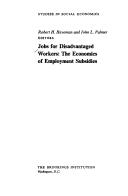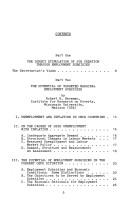| Listing 1 - 10 of 55 | << page >> |
Sort by
|

ISBN: 9780815735052 0815735057 Year: 1982 Publisher: Washington: Brookings Institution,
Abstract | Keywords | Export | Availability | Bookmark
 Loading...
Loading...Choose an application
- Reference Manager
- EndNote
- RefWorks (Direct export to RefWorks)

ISBN: 9264123741 Year: 1982 Publisher: Paris OECD
Abstract | Keywords | Export | Availability | Bookmark
 Loading...
Loading...Choose an application
- Reference Manager
- EndNote
- RefWorks (Direct export to RefWorks)
Book
Year: 1978 Publisher: Paris: PUF,
Abstract | Keywords | Export | Availability | Bookmark
 Loading...
Loading...Choose an application
- Reference Manager
- EndNote
- RefWorks (Direct export to RefWorks)
Book
Year: 1980 Publisher: Washington, D.C. : Employment and Training Administration, Office of Youth Programs,
Abstract | Keywords | Export | Availability | Bookmark
 Loading...
Loading...Choose an application
- Reference Manager
- EndNote
- RefWorks (Direct export to RefWorks)
Youth --- Employment subsidies --- Employment
Book
Year: 2005 Publisher: Washington, DC : Congressional Budget Office,
Abstract | Keywords | Export | Availability | Bookmark
 Loading...
Loading...Choose an application
- Reference Manager
- EndNote
- RefWorks (Direct export to RefWorks)
Book
Year: 1996 Publisher: Cambridge, Mass. National Bureau of Economic Research
Abstract | Keywords | Export | Availability | Bookmark
 Loading...
Loading...Choose an application
- Reference Manager
- EndNote
- RefWorks (Direct export to RefWorks)
Wage subsidies to private employers have often been proposed by economists as a potentially flexible and efficient method to improve the earnings and employment of low-wage workers. This paper lays out the basic economics of wage subsidies; examines issues arising in the design of alternative forms of wage subsidies; and reviews evidence on the effectiveness of recent U.S. wage subsidy programs and demonstration projects. Wage subsidies to employers to hire disadvantaged workers appear to modestly raise the demand for labor for those workers. Stand-alone wage subsidies (or employment tax credits) that are highly targeted on very specific groups (such as welfare recipients) appear to have low utilization rates and may (in some cases) stigmatize the targeted group. But new evidence based on an examination of changes in eligibility rules for the Targeted Jobs Tax Credit, the major U.S. wage subsidy program for the economically disadvantaged from 1979 to 1994, suggests modest positive employment effects of the TJTC on economically disadvantaged young adults. Policies combining wage subsidies with job development, training, and job search assistance efforts appear to have been somewhat successful in improving the employment and earnings of specific targeted disadvantaged groups.
Periodical
Publisher: Washington, D.C. : Dept. of the Treasury, Internal Revenue Service
Abstract | Keywords | Export | Availability | Bookmark
 Loading...
Loading...Choose an application
- Reference Manager
- EndNote
- RefWorks (Direct export to RefWorks)
Employment subsidies --- Tax credits --- Hurricanes --- Economic aspects
Book
Year: 2001 Publisher: Washington, D.C. : World Bank, Development Research Group, Poverty Team,
Abstract | Keywords | Export | Availability | Bookmark
 Loading...
Loading...Choose an application
- Reference Manager
- EndNote
- RefWorks (Direct export to RefWorks)
A wage subsidy increased private sector employment among poor workers in a welfare-dependent region of Argentina, but extra skill training had no impact.
Employment subsidies --- Poor --- Welfare recipients --- Employment --- Employment
Periodical
Year: 1996 Publisher: [Washington, D.C.] : Dept. of the Treasury, Internal Revenue Service
Abstract | Keywords | Export | Availability | Bookmark
 Loading...
Loading...Choose an application
- Reference Manager
- EndNote
- RefWorks (Direct export to RefWorks)
Book
Year: 1985 Publisher: [Lund] : University of Lund,
Abstract | Keywords | Export | Availability | Bookmark
 Loading...
Loading...Choose an application
- Reference Manager
- EndNote
- RefWorks (Direct export to RefWorks)
Employment subsidies --- Government spending policy --- Employment subsidies. --- Government spending policy. --- Sweden.
| Listing 1 - 10 of 55 | << page >> |
Sort by
|

 Search
Search Feedback
Feedback About UniCat
About UniCat  Help
Help News
News